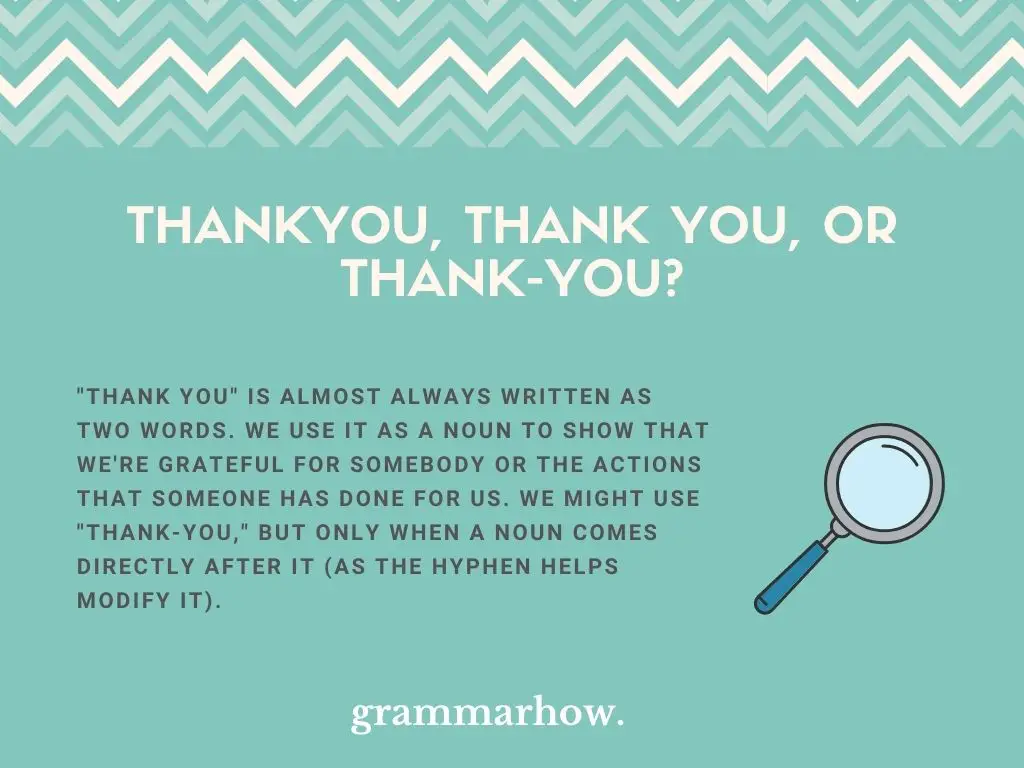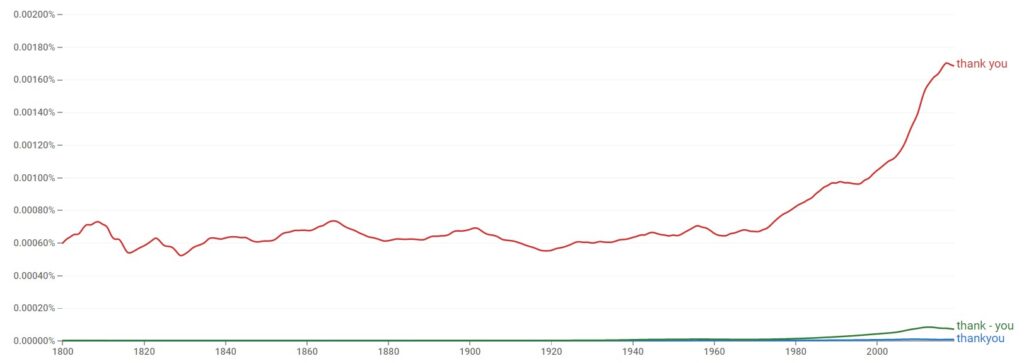If you want to thank someone correctly, you’ll want to know how to write it. This article will teach you whether “thank you” is one or two words. We can also share when it’s hyphenated (even if it’s not a very common form to come across).
Thank you vs. Thank-you vs. Thankyou
“Thank you” is almost always written as two words. We use it as a noun to show that we’re grateful for somebody or the actions that someone has done for us. We might use “thank-you,” but only when a noun comes directly after it (as the hyphen helps modify it).

According to Google Ngram Viewer, “thank you” is by far the most popular choice of the three. The large difference in popularity shows that the noun form is the one you’ll come across most.

In The Cambridge Dictionary and The Oxford Dictionary, only “thank you” has an entry worth mentioning. Both dictionaries mention that it’s a phrasal noun, which we use when we want to appreciate someone.
The Cambridge Dictionary also briefly mentions “thank-you” in some examples. It states that it’s common for this form to be used when it comes directly before another noun.
These examples will explain when the hyphenated form might be appropriate:
- Noun: I was going to say thank you, but I don’t think I will now.
- Adjective: That was a weak thank-you note, but at least you tried.
Is “Thankyou” One Word?
“Thankyou” is never correct as one word. When writing it, it’s important to make sure we keep “thank” and “you” separate. We use it in this form because they are two completely different words (a verb and a pronoun combination). The one-word option is incorrect.
Here are some examples to show you that it doesn’t work:
- Correct: I’m not going to say thank you to him. I don’t like him enough.
- Incorrect: It’s just a simple thankyou message. Why can’t you just go up there and say it?
- Correct: I was going to say thank you, but now I don’t think I will.
- Incorrect: Will you just say thankyou, please? I feel like I deserve that.
Is “Thank you” Two Words?
“Thank you” should always be written as two words. This is the only grammatically acceptable form, so you should make sure you stick to it when you’re using it as a noun. It should be two words to help us distinguish the clear meaning.
If you’re struggling, here are some examples:
- I wanted to say thank you for all the kind things you did for me in my time of need.
- That’s the best thank you that you’ve ever given to someone, I have to say!
- Thank you! I didn’t think anyone was going to help me with this.
- Don’t say thank you! It’s the least I could do to help out.
Is “Thank-you” Hyphenated?
“Thank-you” is hyphenated whenever a noun comes directly after it. This only applies if “thank-you” modifies the noun in question. AP Style rules teach us that we can create compound adjectives with hyphens when both words modify a noun.
As long as you remember the AP Stylebook rules, you’ll have an easy time remembering “thank-you.” We use the hyphen when “thank-you” comes directly before a noun because it helps us to establish modification in the correct way.
Here are a few examples to give you a better clue:
- I just want to send them a quick thank-you message to let them know that we’re grateful.
- This is a thank-you note for the gift I got them at their wedding.
- I need to write a thank-you email to my boss for letting me get so much time off.
- It’s not a thank-you note, but it’s the closest thing you will get to one from him!
Is “You” Capitalized In The Word “Thank-You”?
Let’s quickly finish up by looking into capitalization rules with hyphenated forms. Though you won’t use “thank-you” often, you might still need to learn about this.
You do not need to capitalize “you” when “thank-you” is written at the start of a sentence. The only time you might capitalize it is if you include it in a title and want both parts of the hyphen form to fit in with the rest of the capitalized words.

Martin holds a Master’s degree in Finance and International Business. He has six years of experience in professional communication with clients, executives, and colleagues. Furthermore, he has teaching experience from Aarhus University. Martin has been featured as an expert in communication and teaching on Forbes and Shopify. Read more about Martin here.
